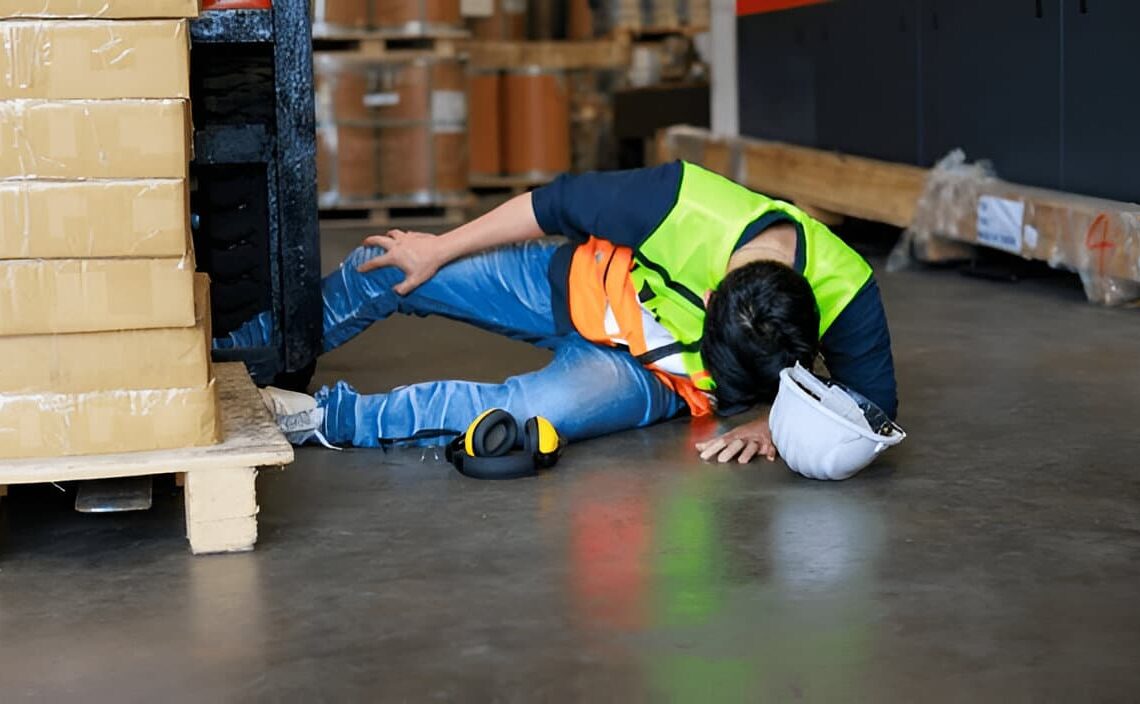What Injuries Are Covered by Workers’ Compensation in Indiana Warehouses?

Workers’ compensation in Indiana warehouses covers injuries that occur within the scope of your employment as long as they can be tied directly to your job duties or work environment.
From strains caused by repetitive tasks to serious injuries involving heavy machinery, the program is designed to provide financial and medical support for workers injured on the job.
Understanding which injuries qualify for coverage is often the most confusing part about seeking the full extent of benefits you may be eligible for under the law.
Insights from an experienced warehouse accident lawyer in Indiana can shed light on eligible injuries, how workers’ compensation benefits apply, and their role in helping fight for a fair payout.
Common Indiana Warehouse Accident Injuries Covered by Workers’ Compensation
Injured while working in an Indiana warehouse? Workers’ compensation may cover a range of common injuries, including:
Musculoskeletal Injuries
Musculoskeletal injuries are some of the most frequent issues warehouse workers face due to repetitive motions, heavy lifting, or awkward physical positions. These injuries typically impact joints, muscles, and tendons, often developing over time or from a single strenuous event. Examples include:
- Back strains: Loading heavy pallets or repeatedly bending can result in injuries to the lower back.
- Shoulder tears: Repeated use of machinery like forklifts may lead to torn rotator cuffs.
- Carpal tunnel syndrome: Typing, scanning inventory, or moving small items repeatedly can cause nerve compression in the wrist.
Even straightforward musculoskeletal injuries can result in long-term complications if untreated. Legal professionals can examine how these injuries affect your abilities and help demonstrate how compensation should reflect the full extent of your limitations.
Traumatic Injuries from Equipment Accidents
These injuries are often caused by mishandling of equipment or machine malfunctions. These incidents may occur unexpectedly, impacting workers through blunt force or crushing injuries. Here are some examples of how this happens in warehouses:
- Forklift accidents: These incidents can involve collisions, rollovers, or improper handling, leading to fractures or deep lacerations.
- Conveyor belt injuries: Machinery accidents may cause crush injuries, broken fingers, or lost limbs.
- Cherry picker falls: Malfunctions or improper operation of elevated work platforms may result in head trauma or fractures.
Traumatic injuries involving equipment often require clear documentation and thorough investigation to prove how they are work-related. An experienced workers’ compensation lawyer can help gather the necessary evidence to secure fair outcomes.
Slip, Trip, and Fall Injuries
Slip, trip, and fall incidents are a significant cause of warehouse accidents. Slippery surfaces, cluttered working areas, or a lack of maintenance can all contribute to serious injuries. Common injuries from such incidents include:
- Broken hips or sprains: These occur when employees slip on spilled liquids or uneven flooring.
- Head injuries or concussions: Falling from ladders or scaffolding can result in serious head trauma.
- Contusions or fractures: Trips over poorly placed boxes or tools lead to physical bruising and broken bones.
Slips and falls often seem minor but can result in complicated injuries that may affect the ability to return to demanding warehouse tasks. Workers’ compensation claims related to these accidents benefit greatly from legal assistance to assess medical needs and wage losses comprehensively.
Overexertion Injuries
Warehouse roles often demand strenuous physical effort, especially over long shifts. Overexertion happens when workers push too hard, causing fatigue, pain, or lasting harm. Examples of overexertion injuries include:
- Heat-related illnesses: Long hours in poorly ventilated warehouses can result in dehydration or heat exhaustion.
- Joint injuries: Repeated heavy lifting or pulling can strain knees, elbows, and shoulders.
- Muscle fatigue: Excessive workload with insufficient rest often leads to chronic muscle aches or injuries.
Overexertion injuries in Indiana warehouses may develop slowly or stem from one poorly planned task. Legal support can help assess claims accurately, especially for injuries that are difficult to measure in the short term.
Chemical Exposure Injuries
Some warehouses store or handle hazardous chemicals, posing risks like respiratory damage or burns. Workers exposed to dangerous substances are at risk of severe health complications, including chronic illness. Examples include injuries such as:
- Chemical burns: Direct skin exposure to corrosive substances can cause painful burns.
- Respiratory problems: Workers inhaling toxic vapors may suffer breathing conditions or long-term lung damage.
- Eye irritation or blindness: Accidents involving chemical splashes can permanently impair vision.
Chemical exposure claims often require detailed evidence linking the injury directly to working conditions. Legal counsel can challenge insurers, who may downplay the extent of damage caused by unsafe warehouse environments.
What Are the Eligibility Requirements for Workers’ Compensation Benefits After a Warehouse Accident?

Employees must meet specific eligibility criteria to receive workers’ compensation benefits after a warehouse accident. In Indiana, these general conditions typically apply:
- The injury must occur within the scope of employment: Injuries sustained while performing job-related duties, such as unloading inventory or operating machinery, are eligible.
- The injury must arise from workplace hazards or activities. For example, falling objects, equipment malfunctions, or repetitive strain injuries must be linked to conditions of the work environment.
- You must be classified as an employee: Independent contractors or freelancers are generally not eligible for workers’ compensation under Indiana law.
- A timely injury report is required: Employees must promptly notify their employer of the injury, typically within 30 days, to avoid delays or denials in the claims process.
- Authorized medical care must be followed: Treatment must generally be sought from healthcare providers approved by the employer’s workers’ compensation insurance.
- The employer must have workers’ compensation coverage: By law, most employers are required to provide workers’ compensation insurance, with exceptions for certain roles, such as farm laborers or railroad workers.
- The injury or illness must temporarily or permanently affect the ability to work: Documentation from a treating physician may be necessary to confirm physical restrictions.
Workers’ compensation cases can involve disputes over an injury’s work-relatedness or the extent of necessary benefits. Legal guidance can help keep the claim on track, offering workers a stronger chance to receive the support they’re entitled to under Indiana law.
What Is Covered By Workers’ Compensation in Indiana?
Medical Expenses
Workers’ compensation covers medical care for injuries and illnesses sustained during employment. This helps workers access the treatments they need without facing financial hardship. Examples of covered medical expenses often include:
- Emergency care: Treatment received immediately after an accident, such as emergency room visits or ambulance transportation.
- Ongoing medical treatments: Follow-up appointments, diagnostic tests, physical therapy, or prescription medications.
- Specialized care: Surgeries, rehabilitation programs, or necessary medical devices like braces or wheelchairs.
- Future medical needs: For serious injuries, compensation may include projected costs for long-term care or corrective procedures.
Medical coverage is often the most immediate concern for injured workers. Legal guidance can help protect injured warehouse employees from insurers who may undervalue claims or delay the approval of necessary treatments.
Wage Replacement
Workers’ compensation typically steps in to provide partial income replacement when an injury prevents you from working. This crucial benefit helps alleviate financial pressure during the recovery period. Wage replacement options include:
- Temporary Total Disability (TTD): Compensation when the injury stops you from working entirely during recovery.
- Temporary Partial Disability (TPD): Payments for reduced earning capacity if you return to work at a lower-paying, modified role.
- Permanent Partial Disability (PPD): Compensation for injuries resulting in permanent but partial loss of function.
- Permanent Total Disability (PTD): Coverage for injuries so severe that returning to gainful employment is not possible.
Calculating wage replacement benefits can be complicated, especially when disputes arise about earning capacity or disability statuses. Legal assistance can demonstrate accurate evaluations of your entitlements.
Vocational Rehabilitation
Indiana workers’ compensation may cover vocational rehabilitation services for employees who cannot return to their prior roles. Examples include:
- Job retraining programs: Teaching new skills that align with physical or cognitive limitations.
- Career counseling: Evaluating potential career paths based on the worker’s abilities and experience.
- Job placement assistance: Helping find suitable employment opportunities within the worker’s capabilities.
Vocational benefits provide a critical safety net for employees facing permanent career changes. Legal professionals can help you understand eligibility and advocate for adequate training opportunities.
Permanent Impairment Compensation
For lasting injuries or disabilities, impairment compensation accounts for how the injury impacts daily life and long-term employment prospects. Examples of covered impairments include but are not limited to:
- Loss of mobility: Compensation for injuries that reduce range of motion or cause chronic pain.
- Partial or total vision loss: Payments for eyesight impairments that affect work capabilities.
- Amputations or severe disfigurements: Compensation for physical losses that limit function or cause lasting hardship.
Because impairment compensation involves technical evaluations, strong legal advocacy may be necessary to make sure ratings accurately reflect the true extent of the injury.
Death Benefits
For fatal workplace accidents, workers’ compensation provides death benefits to eligible dependents of the deceased employee. These benefits aim to alleviate financial stress on surviving family members. Covered elements include:
- Funeral and burial expenses: Assistance to cover costs associated with arranging services.
- Income replacement for dependents: Payments to assist spouses, children, or other qualifying family members who relied on the worker’s financial support.
Filing for death benefits can be a complex and emotional process. Legal counsel helps family members focus on healing while attorneys pursue all available avenues of compensation for the loss of a loved one.
When Should I Contact an Indiana Workers’ Compensation Lawyer About Warehouse Accident Injuries?

Navigating a workers’ compensation claim after a warehouse accident can be confusing, especially when challenges or uncertainties arise. Common situations where contacting a lawyer could make a significant difference included but are not limited to:
- Delayed benefits or unexplained claim processing delays.
- Denied claims or disputes over whether the injury is work-related.
- Discrepancies in wage calculations or benefit amounts.
- Employer retaliation or pushback after filing a claim.
- Questions about eligibility for additional compensation for permanent impairments.
- Need for a second opinion regarding medical evaluations or treatments.
- Complex injuries requiring long-term care or vocational training.
- Potential third-party liability when other entities may share responsibility for the injury.
Professional guidance can make the claims process smoother and help you address disputes so you can confidently move forward from your injury.
Workers’ Compensation for Indiana Warehouse Injuries FAQs
Does workers’ compensation cover pre-existing conditions that worsen at work?
If a pre-existing condition is aggravated or made worse by your work responsibilities or a specific incident, it may be eligible for workers’ compensation coverage. Documentation from medical professionals outlining how the job contributed to the aggravation is often critical in such cases. Consulting with a legal professional can help clarify your eligibility.
What if I miss the deadline to report my injury?
Failing to report your injury within the required timeline, typically 30 days, may jeopardize your claim. Employers need timely notifications to validate claims effectively. Speaking with a legal professional may help you explore options if delays occur.
Can I be fired while receiving workers’ compensation benefits?
Workers cannot be terminated in retaliation for filing a workers’ compensation claim. However, employment laws do not always protect injured workers indefinitely. A legal advocate can examine the circumstances and advise on your rights if termination occurs during your claim process.
How long does workers’ compensation coverage last?
The duration of the benefits depends on the severity of the injury and the type of compensation granted. Temporary benefits last only while recovering, whereas permanent benefits may extend for a longer period. Legal professionals can help confirm whether your compensation aligns with your specific needs and rights.
Seeking Workers’ Compensation Benefits For Warehouse Accident Injuries in Indiana? Contact Klezmer Maudlin For Experienced Legal Support
Workers’ compensation provides essential protection, helping employees recover without the financial strain of unpaid medical bills or lost wages. But when challenges arise, a skilled workers’ compensation attorney can provide the legal guidance needed to protect your opportunity for maximum compensation.
Are you facing challenges with a warehouse injury claim? For tailored advice and support navigating your case, contact Klezmer Maudlin P.C. online or at (317) 569-9644 to explore your rights and legal options.

